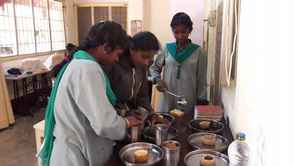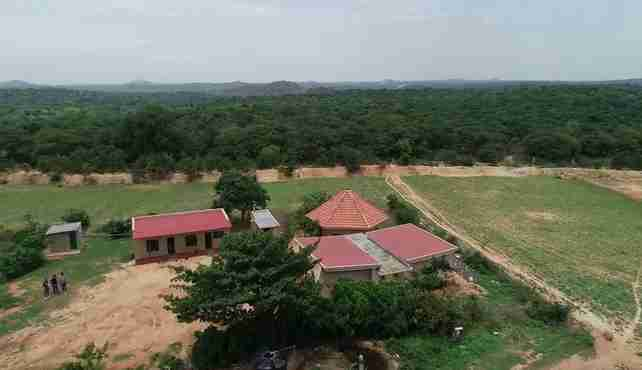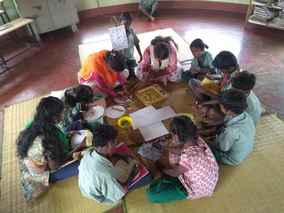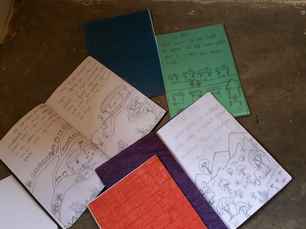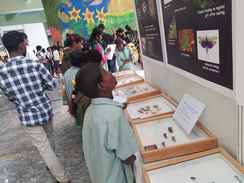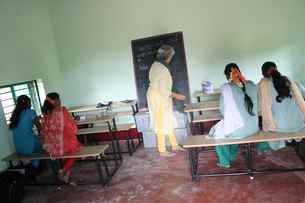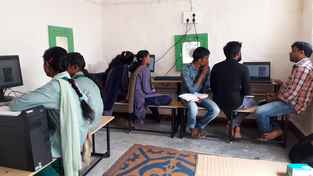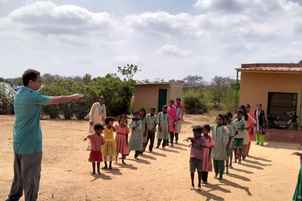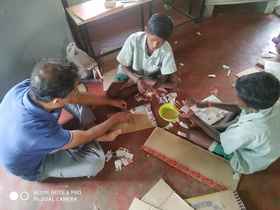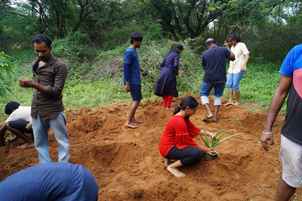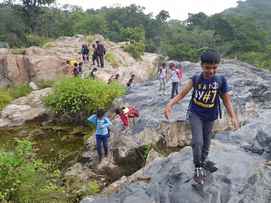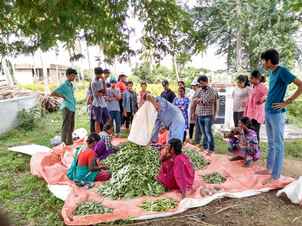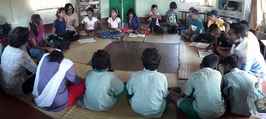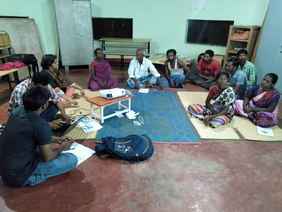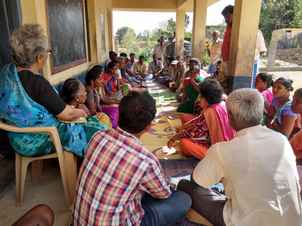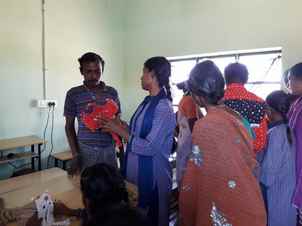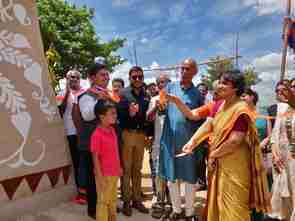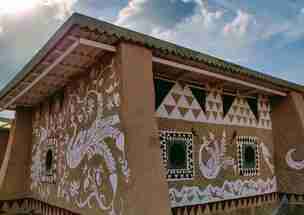Foundation for Education, Ecology and Livelihood
Annual Report

Celebrating the land and expressing gratitude for the life that it nourishes
|
Office address Krishnamurti Foundation India, Haridvanam, Thatguni Post, Kanakapura Road, Bengaluru – 560082. Karnataka |
Kaigal Conservation Center, Andhra Pradesh. |
Web: www.feelforearth.net
Email: feel@feelforearth.net
Table of Contents
Our response to the pandemic 3
Schools for the tribal communities 4
Conservation programs at the Centre 7
Environment Education Program 7
Teacher development programs 10
Teacher education program of the KFI 10
An online program for Kendriya Vidyalaya teachers 11
Researching and supporting sustainable livelihoods 11
Building Institutional Linkages 12
Program evaluation by the National Biodiversity Authority 12
Supporting other educational interventions 12
Documentation and publications 12
Note from the Trustees
This is a situation unlike any before; we are faced today with a situation of great challenges and uncertainty. The pandemic is relentless in its spread, disrupting lives and livelihoods as we know it, forcing us all to examine our societal systems and explore alternatives. This is perhaps the time to forge new solutions, that are equitable and build resilience in the communities.
Our focus in the last few months have been on internal capacity building, education and supporting the communities we are working with through outreach and educational activities. Our schools have been closed; but children have their snacks and hot lunch at school; teachers meet the children individually and in the community to engage them in different age-appropriate learning activities. With the economic distress and pandemic-induced loss of livelihoods, there is an urgent need to look at skill building and livelihood generation activities in the rural areas. One of the focus areas in the next coming months would be to partner with Kaigal Trust, a community enterprise we have incubated, and design and conduct capacity building programs for the communities. Our schools, long functioning as community learning spaces, will play an even bigger role in community education as take up more programs for community (adult) education and supporting the educational programs in the local government schools.
The current crisis has served to underscore the core organizational objectives of FEEL – conserving the local ecology and empowering communities – even as we develop strategies for equitable and sustainable development. We are pleased to share with you a brief report of our work during the last year and an update on current activities and proposed plans.
Our response to the pandemic
The pandemic has demonstrated how the field level ownership of the program has taken shape; our field centre at Kaigal and our schools have shown their maturation as safe spaces for education and empowerment. Maintaining the morale of the team and also keeping them and their families safe has been our highest priority through all the activities in the last few months.
Ever since the relaxation of restrictions, or field centre at Kaigal has been open, with staff coming in on rotation, maintaining the centre as well as working diligently, and with all safety precautions, to keep the community enterprise running. Maintaining social distancing and following all hygiene norms, the members of the community enterprise have been working hard to meet production deadlines and meet orders for the products, even as the markets tentatively opened up and supporting themselves and the communities of suppliers. They have also been making and sending masks to local and other hospitals, sometimes against orders and on few occasions as our contribution. – is this correct?
Our schools remain closed for formal instructions, as per the government instructions. However, our teachers have been interacting with the communities and children continuously since the lockdown. Started initially with providing dry rations, now the schools provide hot lunch on all the days and two snacks for the children. In addition, the teachers meet the children one and one, in the communities, sharing learning activities for the children. We are now developing digital resources that can be disseminated in the communities for supporting children’s reading and learning.
The teachers have also translated an information booklet on COVID, developed by a team of epidemiologists and are sharing this with communities, as well as working on disseminating this through local social media groups. Drawing upon our experiences, we have also been advocating in the media and through our blog spaces on the need to re-imaging education and our models of development.
Year-in-review
Schools for the tribal communities
The schools continued with the focus on curricular innovations as well as continuous teacher
development. Attendance is regular in schools of all children above 3 years of age in these
villages. At the end of Class 5 (the level up to which we are registered) many of them continue
their studies by joining a Government High School day school or residential.
Some older children in the villages – who had not continued their education with government schools or had dropped out enrol with the National Institute of Open Schooling to finish their Class 10 and 12. These students are mentored by the teachers to complete the exam and some continue their education through vocational, diploma or college degree programs. Our students who have joined the high schools in Kadapanatham and Byreddipalli are doing well, according to the teachers’ feedback from these schools.
New curricular inputs
Designing and delivering a contextually relevant curriculum, has been the primary focus of our schools since inception. The students learn in mixed age groups and lessons are planned by the teachers according to the levels of the children. Our school program continued the focus on languages, mathematics, environmental studies, games and crafts (cardboard, embroidery and macarame). The older students were also introduced to the topics of personal and preventive health.
Four learning programs were conducted during the year, in addition to the regular school program:
- A story telling and writing program for students in Telugu and English (August – October) 2019), facilitated by Ms Sriranjani Ranganathan
- A hands-on experiential, science program (December 2019), facilitated by Dr Sudha Premnath and Mr C Premnath
- A digital learning program for the teachers and older students (throughout the year)
- A physical fitness and craft making workshop (February 2020), by Mr Gopal Sharma
A few moments from our school programs:
|
|
|
|
|
|
|
|
|
|
|
|
|
|
|
|
|
|
|
Conservation programs at the Centre
Maintaining the land and continuing the afforestation programs remain a key focus of the program. Maintaining the land, creating rainwater harvesting structures, maintaining the nursery and herb garden were undertaken on a continuous basis, and were also woven into the Environment Education Programs. During this year, we completed a year-long collaboration with the Indian Institute of Science Education and Research, where we provided support to the field research work of their masters and doctoral students. Our support was well-received and our team and school students benefited from the knowledge sharing by these research students as well.
The following is the feedback from Prof. Dr Hema Somanathan, School of Biology, IISER, Trivandrum.
|
On the whole, our experience at KCC has been very positive and we were able to carry out our research peacefully in the knowledge that our students were safe and well looked after. We thank the entire team at KCC for the cooperation, support and good will extended to us and our students. Our best wishes will always remain with the KCC team. |
Environment Education Program
The environment education program (EEP) started in 2007 with the objective of sharing with schools and students, the possibilities, challenges and strategies for a sustainable and ecologically responsible way of life. Bringing communities together, introducing students to different knowledge systems, creating new contexts for learning and allowing students to experience nature are the key ideas behind this program.
During this year, 5 schools have participated in the program so far including students from Class 1-12 and a total of 10 programs were conducted. Activities taken up included farming, survey of educational facilities in villages, interacting with the communities and students in the tribal villages and participating in afforestation of the land.
|
|
|
|
|
|
The primary objective of these programs has been to sensitize children to the beauty of nature and to allow them to have the experiences with which they can imagine an alternative to the urban, consumerist way of living.
The following reflections we heard from the students during the program have been a validation of our program and its principles.
|
“Somehow when we see nature in TV or photos, it seems so surreal and dazzling. But what struck me was the ordinary looking beauty of nature. And somehow that was more beautiful” “I was able to think about how much I really need. We had very little things here – but did not seem to matter. I began to think if we really need the so many things we use in the city” “I really did not want to come here – but the last few days have really changed me. I felt so touched and honoured that the farmers would even allow us to work with them, we know nothing, yet they took us in and allowed us to work” |
Community resource centres
One of the core ideas of the organization is to develop models of community empowerment and skill building that are contextually relevant. With the pressure of increasing migration and depletion of the environmental resources in rural areas and it was becoming clear that working with communities and building awareness on their resources, lives and livelihoods are very critical. During interactions and with the communities, it also became clear to us that many of them were viewing education as having the potential for empowerment and mobility. Taking a cue from the communities’ aspirations emerged a model of Community Education Centres that would make the schools a local resource centre for education and awareness building. This project is partly supported by Kotak Bank CSR and is in collaboration with IT for Change.
|
|
|
Right now, Community resource centres are operational in three villages – Kalligutta, Mugilupodalarevu and Vengamvaripalli. The scope of learning programs in each of these centres varies from literacy for adults, learning enrichment programs for local government schools, training local youth in designing educational environments, supporting the tribal community children in government schools, craft learning programs for adults, documentation of local, oral history and much more. These programs are evolving in their scope and reach, and in the current scenario, we expect this to become much more important.
|
|
|
During this year, a new building was constructed in the Kalligutta school for anchoring the community education program and the pre-school program. This building was funded by Round Table, Bengaluru and was inaugurated in June 2019.
|
|
|
Teacher development programs
Teacher education program of the KFI
We offered a 3-day program for the participants of the Teacher Education Program of the Krishnamurti Foundation India. The participants were introduced to all the dimensions of work at the Kaigal Conservation Centre – education, biodiversity conservation and capacity building for sustainable livelihoods. The activities included nature and forest walks, working on the land, interacting with our tribal schools, interacting with the local communities as well as meeting and working with the members of the livelihood enterprise. Many participants found the program to be very enriching and many felt that it allowed them to connect the educational philosophy of J Krishnamurti and programmatic interventions.
The following is a testimonial from one of the participants:
|
This was a great opportunity to be close to nature and to recognize its importance. …. we got to explore nature through night walks, trekking, morning walks, learning the medicinal values of some plants, knowledge about different life forms and participating in certain events like making organic manure for the plants, walking alone, sitting in silence… All Such activities help us to connect closely with nature and to understand me as a human where we stand with nature. I also appreciate KFI for supporting local people and their livelihood . If I do get an opportunity to visit Kaigal again I would not miss it. |
An online program for Kendriya Vidyalaya teachers
With near universalization of elementary education, the number of students entering upper primary and secondary education from very heterogenous backgrounds is increasing. Language as well as other contextual factors are important factors that will determine the success of these students when they enter high school. Schools have to look at a variety of resources and tools for supporting the learning paths of all students so that quality education is achieved. While digital technologies are being used by many private schools for the elite students, we wanted to explore how these technologies can help teachers become more empowered as facilitators and create an inclusive learning environment. We designed and conducted an online course, in partnership with IT for Change, for mathematics teachers on how to use digital tools for supporting mathematics learning.
The below is a testimonial from one of the teachers.
|
Yes we thoroughly enjoyed every moment and hope we meet again soon. A big big thank you to all the members … which made it happen. You engaged us every moment and brought the best out of us… May be this is what blended learning is all about. Please continue to support us with your vast experience. |
Researching and supporting sustainable livelihoods
Kaigal Trust, the community enterprise, that as been incubated and mentored by FEEL is on its path to becoming operationally and financially independent.
Our key initiatives during this year have been:
- Researching new products based on forest produce
- Automation of the entire accounting, billing and sales reporting, with more members being trained on he maintenance of systems
- Streamlining the delivery channels for the products, allowing the organization to deliver to more geographies
Building Institutional Linkages
Building linkages and sharing learning across similar endeavours is something we recognize as important. We have consciously made efforts to build linkages across academia, government and non-government sectors. Some of our efforts in this direction are described below.
Program evaluation by the National Biodiversity Authority
We participated in the evaluation of access benefit sharing mechanisms, by UNEP, organized by the National Biodiversity Authority and shared the experience of the livelihood program, in bringing about sustainable livelihoods from forest bio-resources. We presented the experience of Kaigal Trust in building alliances with communities and strengthening sustainable harvesting practices and we were the only organization that represented a community led model for Access and Benefit Sharing, a unique distinction. We were the only community led enterprise to be invited to this evaluation.
Supporting other educational interventions
FEEL has been providing consulting services to a project for demonstrating technology integrated pedagogies in government high schools in Bengaluru. This includes working with students and teachers, demonstrating progressive pedagogies integrating the use of digital technologies.
Educational conferences
A research project was undertaken to understand the areas of teacher professional development needed for creating inclusive learning environments through a comparative study of tribal schools and the government schools; this paper was presented at the Comparative Education Society conference, held in JNU in December 2019.
Documentation and publications
Sharing our experiences is something that we recognize as important and we have been writing and communicating in formal organizational spaces, blogs and media.
 KEEP was recognized as one of the 6 best practices of social change from among 95 interventions, by the Azim Premji University, as part of their initiative called “Stories of Change”. Our case study was published as part of the compendium of social change interventions, brought out by the Azim Premji University.
KEEP was recognized as one of the 6 best practices of social change from among 95 interventions, by the Azim Premji University, as part of their initiative called “Stories of Change”. Our case study was published as part of the compendium of social change interventions, brought out by the Azim Premji University. Publication of the case study of the Kaigal Trust, in collaboration with the Andhra Pradesh State Biodiversity Board, describing the efforts of the organization in demonstrating a community level initiative for Access and Benefit Sharing.
Publication of the case study of the Kaigal Trust, in collaboration with the Andhra Pradesh State Biodiversity Board, describing the efforts of the organization in demonstrating a community level initiative for Access and Benefit Sharing.- Sriranjani Ranganathan wrote an article in the Deccan Herald arguing that even as we deal with the public health challenges it is time to reclaim education and take a look at the role of schools in creating an equitable society.
Directions for the future
- Upgrading the schools to upper primary to provide education for students upto Class 7. It has been our observation that students will benefit from a few more years of being in a free and culturally responsive environment like ours for them to develop the skills of learning that would enable them to succeed in the mainstream education. Having the school upto Class 7 will also give us more opportunities to integrate the elements of the Yanadi communities’ traditional knowledge systems into the school curriculum.
- Expand and strengthen the network of of community learning and resource centres in select villages around the area. These centres will focus on building functional literacy, numeracy, citizenship education as well as build skills for livelihood. It is the vision of these centres that they become spaces for continuous learning for the community where they learn to engage with and act on different issues around health, conservation, livelihoods and education.
- At the request of the communities, our schools in the tribal communities have set up a play environment for the young children (aged 2.5 – 6 years) to come and explore in a safe, stimulating environment. The NEP 2020 has brought into its ambit early childhood education. During this upcoming academic year, this program will be strengthened to become an appropriately resourced early childhood learning environment, which will include contextually relevant activities for the young children. Our endeavour will also be to share our learnings from our experience with the local anganwadis.
- With the current pandemic situation and the restrictions on schools, we expect that this year will have vastly reduced school time and instruction. Our plans are to integrate digital resources and methods for reaching out to children, even if the physical reopening is staggered/ delayed.
- Continue the teacher development programs for the teachers in the Sanctuary Schools, through digital methods like audio conferencing for learning sharing and ideating on resource creation, in Social Science, Mathematics and English.
- We also plan to take up the training of the community level facilitators in the development of learning materials; this will also be done in a remote, distance mode.
- Develop a program for digital literacy and a digitally enabled social science curriculum for the students registered with the National Institute of Open School
- Supporting the establishment of a rural development centre for skill building and contextually relevant education that will support the documentation, dissemination and fair use of traditional knowledge systems as well as mobilising the local community and building awareness on biodiversity conservation and management



